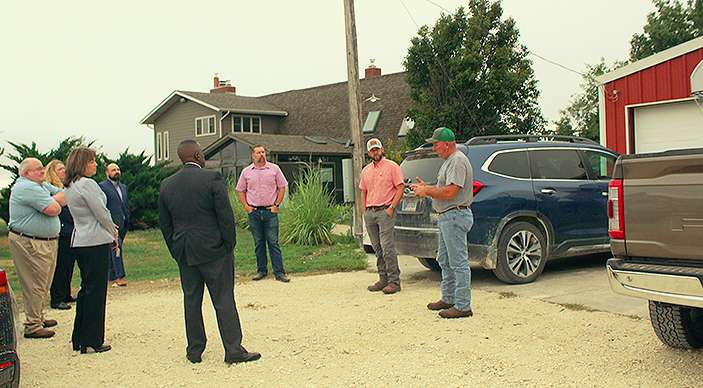
If you or someone you know is experiencing a mental health crisis, you can call the new behavior health/suicide hotline at 988.
High Plains Mental Health Center's emergency after-hours telephone number is 1-800-432-0333.
By CRISTINA JANNEY
Hays Post
Suicide rates among farmers in Kansas are up to seven times higher than state rates.
Members of a panel on Thursday said high stress among farmers combined with a reluctance of individuals to seek professional help has led to a mental health crisis.
Representatives of the U.S. Department of Health and Human Services and U.S. Department of Agriculture were in Hays Thursday to talk to local farmers and listen to the panel, which was assembled by High Plains Mental Health Center.
Attendees included Joseph Palm, regional director, HHS Intergovernmental and External Affairs; Kimberly Nelson, regional administrator of Substance Use and Mental Health Services Administration; Nancy Rios, regional administrator of Health Resources and Services Administration; Nickolas Clasen, HHS Intergovernmental and External Affairs; and Christy Davis, Kansas state director of USDA Rural Development.
Suicide by the numbers in Kansas
Kansas' suicide rate is higher than the national average. It increased 65 percent between 2001 and 2020, said Dania Zolk, section director of injury and violence prevention at the Kansas Department of Health and Environment.
Suicide is the second leading cause of death for Kansans ages 10 to 34. Suicide in 2020 cost the state $5.7 billion in medical expenses and work loss.
The highest rates are among white males. The suicide rates for rural and frontier counties were 58 percent higher than the state rate.
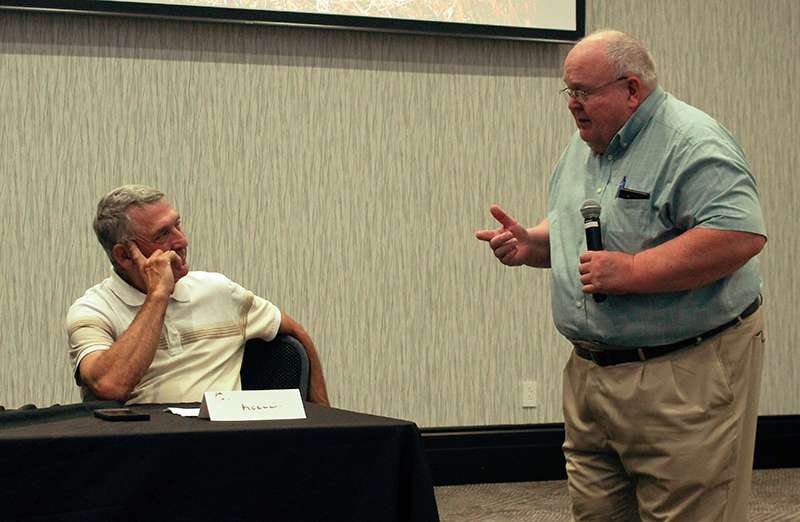
Recovery after the 4-Counties Fire
Duane Keller grew up on a farm in Trego County. He and his wife lost their home and all of his belonging in the Four Counties Fire in December.
Nine hundred acres of farm ground and 50,000 bushels of corn also burned while the couple was visiting Kansas City.
The couple had built the home 40 years ago with the help of their children.
"We got a call from our daughter, and she said you're home's gone," Keller said with a crack in his voice.
"On the way home, I told my wife, 'Look in the back seat of the pickup.' She said there is nothing back there except a couple of bags. I said, 'Well, that's all we got.'"
He said it is therapeutic to talk about the loss and each time he tells the story, it gets easier.
"Out of tragedy, I think comes opportunities," he said. "I think our family's stronger. I think our son and daughter appreciate us a lot more, and we appreciate what we had.
"I tell people, on a happy side, how many people at 74 years of age get to build a brand new home and put all new crap in it," he said with a smile, "and the insurance company is going to pay for it."
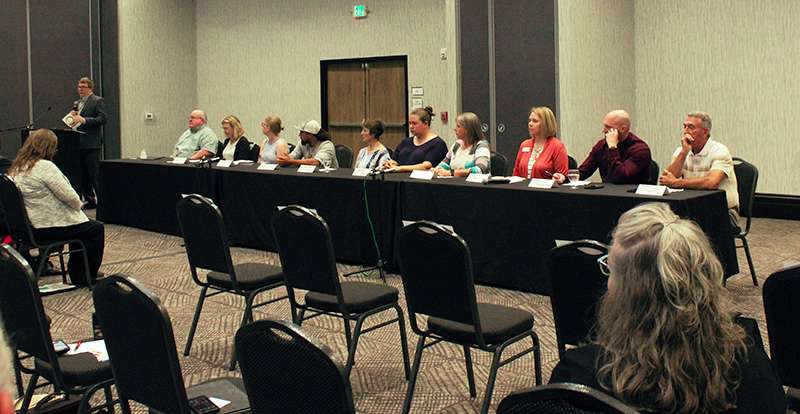
The damage from the fire lingered. Initially, the wind blew away much of the topsoil from the barren land. The ash from the fire damaged the fertility of the soil. Keller planted and lost two rounds of crops on the burnt ground. A third planting of milo is finally growing.
Keller said farming has always been stressful.
"How many of you would check the markets in the afternoon and you've lost $200,000, but you still eat supper that night? You still move on," he said. "Or you go in to buy fertilizer and it's up four times what it was the year before, but you still write the check."
Isolation pervasive for farm families
Brenda Seaman is a licensed clinical social worker at High Plains Mental Center but also comes from a multi-generation farm family.
"As has been said, we deal with things that are not in our control — commodity prices, input prices, weather, government policies that change. We are used to that," she said.
"What I have seen in recent years is a dwindling of resources that help us be resilient. What I mean by that is our communities, our connectedness and our growing isolation."
Many farmers are working additional jobs off the farm and rural populations are shrinking as farms consolidate.
"There's no time to gather in those informal settings that we used to do, drink a cup of coffee at the local elevator or co-op and talk about the mutual stressors and mutual joys," she said.
She added, "Isolation in my view together with the difficult financial time can create despair hopelessness and a loss of shared purpose. When you are doing a really tough job, that's a big deal."
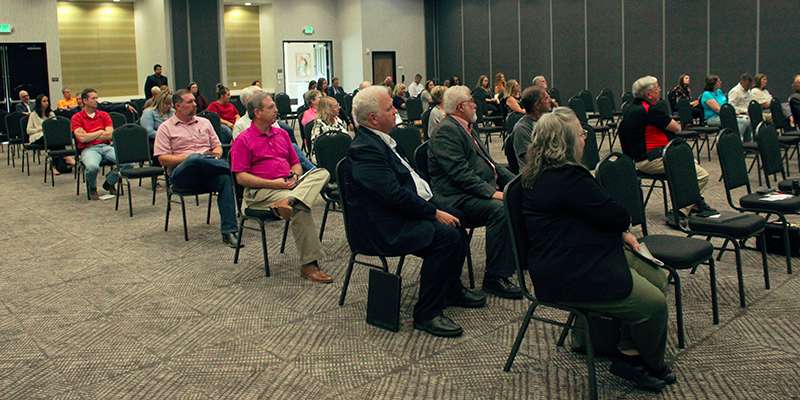
Farms used to be operated by multiple generations of a family — grandfathers, uncles, fathers and children.
"The weight of this now can be on the farmer alone," Seaman said, "because it is no longer financially viable sometimes to hand that farm down, so kids are working off the farm."
Heartbreak of farm life
Jessie Wyrill, who lives on a farm in Phillips County, said separating work from home life is impossible on a farm.
Wyrill, holding back tears, talked about the heartbreak of losing a cow and her calf during birthing.
"Imagine moments like that building up day after day," she said. "Tomorrow it might be a bolt that breaks on the bailor and keeps them from finishing before supper and they lose out on spending time with their family. Then the guilt comes."
Wyrill, who is on the Phillips County Hospital Board, said wait times for mental health care are a barrier to many rural Americans. These wait times can be anywhere from two weeks to eight months.
"How is someone who is struggling expected to wait that long to get help and how do they feel if they are just put on the back burner," she said.
Need for telehealth, broadband expansion
Farmers, who are subject to the needs of their livestock or the whims of the weather, can't commit to appointments set far in advance, she said.
This coupled with a desire for privacy makes telehealth a more viable option for many farmers, Wyrill said.
Panel members said high-speed internet is still lacking for many rural families. If you happen to be next to a fiber optic line and can access service with that provider, access is good.
However, panel members gave examples of families who couldn't access internet access when the fiber optic cable was as close as across the road from their homes. One company wanted to lay fiber across a farmer's land but refused to give him internet access because the farmer was not in their coverage area.
The panel members said expanding broadband is essential in expanding telehealth services to rural communities, but business models and regulations are getting in the way of access.
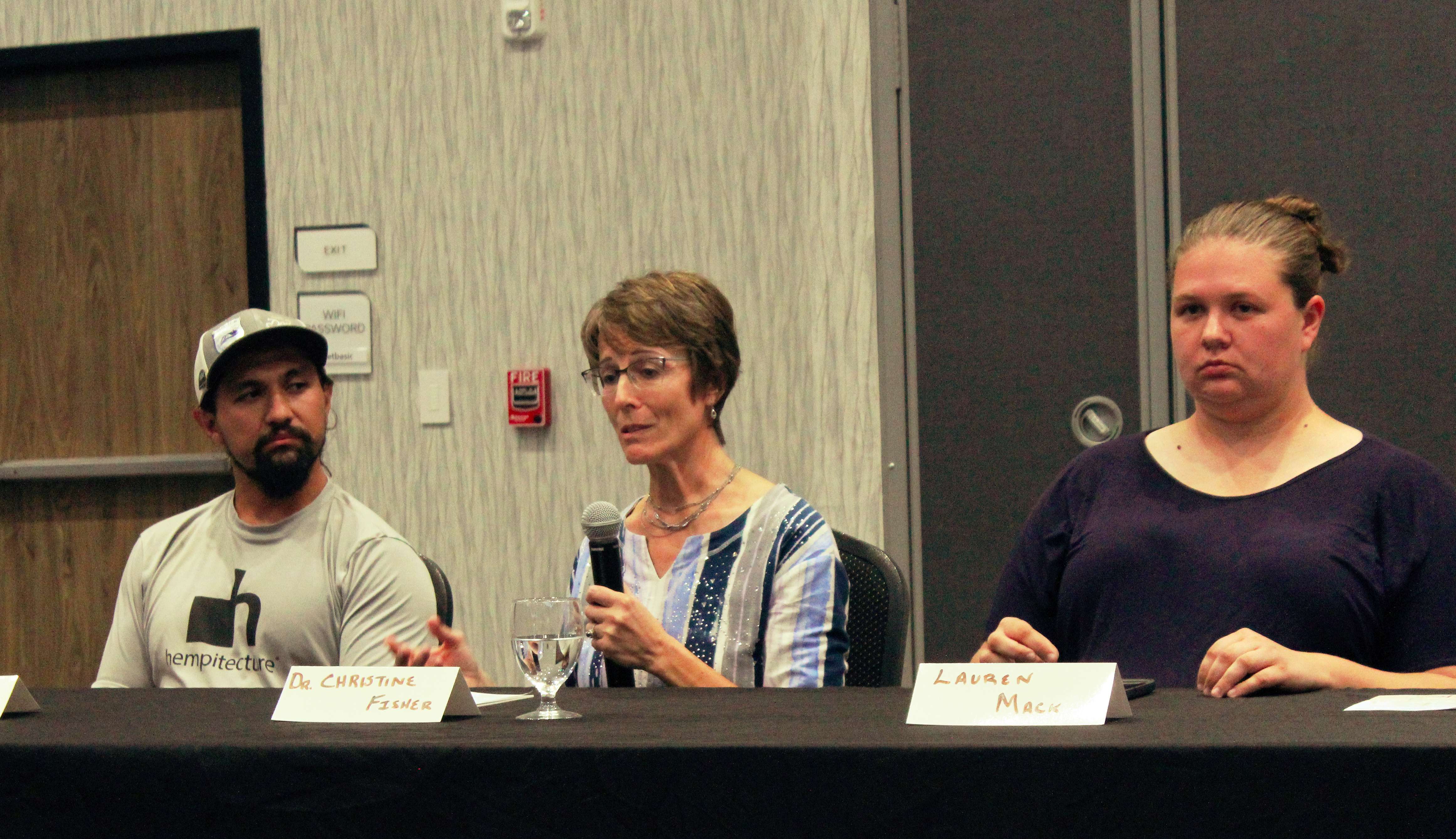
Dr. Christine Fisher, medical director of First Care Clinic in Hays, promoted the use of the integrated health approach that is used at First Care. All First Care patients are screened for both physical and mental health needs when they are seen for appointments.
"People don't like to come back and talk about I'm depressed. I have suicidal thoughts," she said. "But if this is just part of the visit — it's included in your visit — they will stay for that. We can do those suicide interventions."
The clinic hired a psychiatric telehealth nurse practitioner for medication management.
"If there is a hole in medical school teaching and nurse practitioner teaching, it is revolving around behavioral health and behavioral health medication management. Very, very poor teaching, unfortunately," she said.
'Weight of legends'
Lauren Mack, is a veterinarian with The Animal Hospital, which has locations in Plainville and Phillipsburg. She works daily with farmers and ranchers.
She talked about the "weight of legends" in farm families.
"When you stand chute side. The legend is grandpa. ... Sometimes it was great-grandpa or it was the neighbor down the road. You not only have an obligation to your family to keep farming but to the whole region and your children. The list becomes vast."
That weight is paired with a lack of secession planning and substance abuse, she said. She said she sees many psychiatric issues and damaged marriages.
Mack added later the ranchers she works with tend to be very isolated, which she said she thought also contributed to mental health issues.
"If you have ever spent all day working by yourself, you have a lot of time to convince yourself of all the things you have done wrong and all of the things that are going wrong and there is a lot of time to get to a place you shouldn't," she said.
She said she has had ranchers break down into tears with her, but she said it took asking questions and reaching out as a friend to get someone to talk about their struggles.
Addressing needs, looking for solutions
Alicia Boor, Cottonwood Extension District agent, said her agency is trying to get as many people as possible training in Question, Pursue and Refer, which is also known as QPR. This one-hour training helps lay people learn techniques to deal with mental health emergencies.
"Most farmers don't want to admit that they are struggling, but they will move mountains to save their buddy," she said.
Andrew Brown, commissioner of Behavioral Health Services for the Kansas Department for Aging and Disability Services, said the governor dedicated $1.5 million in her budget this year for suicide prevention.
On July 16, the new 988 mental health/suicide hotline launched. It will work much like 911. The majority of the calls to the line will be answered by workers in Kansas.
Kansas is also working to open crisis centers, as well as mobile crisis units, Brown said.
KDHE has applied for a grant from the Centers for Disease Control for mental health programs among youth in agriculture in frontier communities in Kansas, Zolck with KDHE said.



